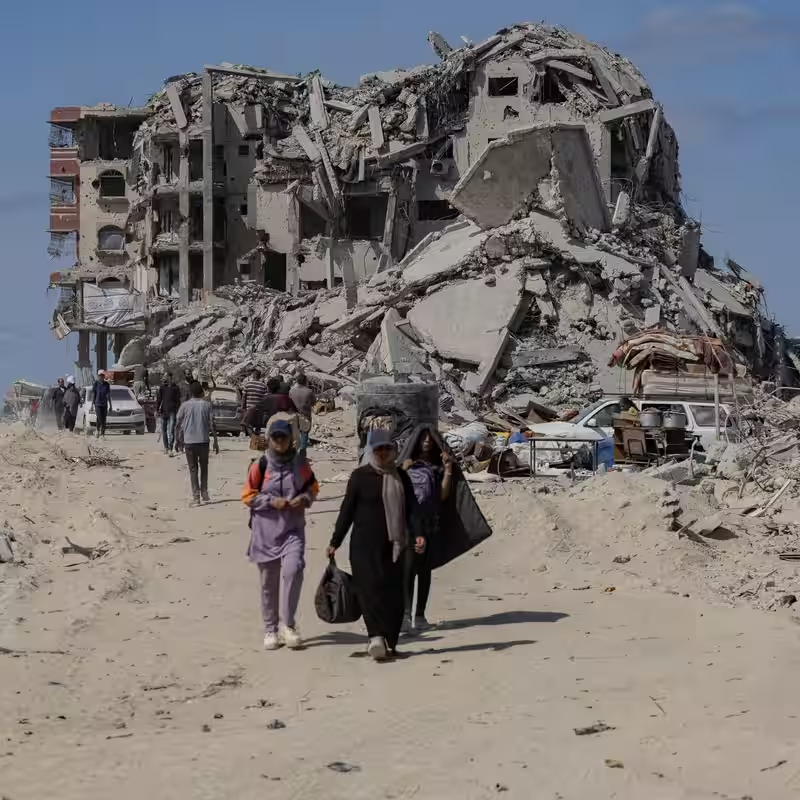Table of Contents
- Ceasefire Milestone: Hostages Freed, Prisoners Released
- Gaza’s Devastation: A Fragile Peace Amid Ruins
- Trump’s Diplomatic Gambit and Controversial Knesset Speech
- The Human Cost: Stories from Both Sides
- What Comes Next for Gaza and the Region?
- Sources
Ceasefire Milestone: Hostages Freed, Prisoners Released
In a dramatic turn of events on Monday, October 13, 2025, Hamas released the last 20 living Israeli hostages held in Gaza. In return, Israel freed 1,968 Palestinian prisoners from its jails—a key component of a fragile ceasefire brokered with U.S. involvement.
The exchange marks the most significant breakthrough since the war began in October 2023, following Hamas’s deadly attack that killed around 1,200 people and led to the abduction of roughly 250 hostages. Now, after two years of relentless conflict that claimed an estimated 67,000 Palestinian lives according to Gaza’s Health Ministry, both sides are cautiously stepping back from the brink.
Gaza’s Devastation: A Fragile Peace Amid Ruins
While families in Israel rejoiced at the return of their loved ones—many of whom had been held captive for over 700 days—the mood in Gaza remained somber. For residents like Saed Abu Aita, 44, relief over the ceasefire is overshadowed by profound grief.
“There’s nothing to be happy about,” Abu Aita said. “My two daughters were killed, my home was destroyed and my health has deteriorated.”
Gaza’s infrastructure lies in ruins. Cities like Jabaliya and Khan Younis have been reduced to rubble. Hospitals are overwhelmed, clean water is scarce, and famine conditions persist in parts of the Strip, according to a UN-backed food security panel.
Rescue teams continue pulling bodies from under collapsed buildings—60 were recovered in the past 24 hours alone. For many Gazans, the ceasefire is not a celebration but a desperate pause in an unrelenting nightmare.
Trump’s Diplomatic Gambit and Controversial Knesset Speech
President Donald Trump, who arrived in Israel just as the hostages were being released, hailed the deal as “the historic dawn of a new Middle East” during a speech to the Knesset—the first by a U.S. president since George W. Bush in 2008.
However, his address quickly veered into campaign-style rhetoric, praising his own administration while criticizing predecessors Joe Biden and Barack Obama. He also broke diplomatic norms by publicly urging Israeli President Isaac Herzog to pardon Prime Minister Benjamin Netanyahu, who faces ongoing corruption charges.
Trump credited his administration’s past strikes on Iranian nuclear facilities as a key factor enabling Arab states to pressure Hamas into the deal. “We took a big cloud off of the Middle East,” he declared.
Later that day, Trump flew to Sharm el-Sheikh, Egypt, for an “International Peace Summit” attended by over 20 world leaders, including Germany’s Chancellor Friedrich Merz and Palestinian Authority President Mahmoud Abbas. Notably absent was Netanyahu, who cited the Jewish holiday of Shemini Atzeret.
The Human Cost: Stories from Both Sides
In Israel, emotional reunions unfolded near the Gaza border. Einav Zangauker tearfully embraced her son Matan, 25, captured from their kibbutz Nir Oz in 2023. “My hero, my champion, my life,” she told him, as he asked about their dog—returned just days after the initial attack.
Among the freed hostages was Alon Ohel, 24, a pianist seized while fleeing the Nova music festival. Friends gathered in Tel Aviv to watch his release live on TV, shouting, “Alon Ohel, come here!”
Meanwhile, in Ramallah and Khan Younis, crowds cheered as Palestinian prisoners stepped off buses from Israeli jails. Some waved keffiyehs and flashed victory signs—but many returned to homes that no longer exist.
What Comes Next for Gaza and the Region?
The ceasefire remains tenuous. While Hamas has agreed to transfer civilian governance of Gaza to another Palestinian entity, it has not committed to disarming—something Israel insists upon before ending the war.
Prime Minister Netanyahu maintains that Israel will not stop until Hamas’s military and governing structures are dismantled. Yet with international pressure mounting and humanitarian crises worsening, the window for a lasting political solution may be narrow.
As world leaders convene in Egypt, the focus shifts from military victory to reconstruction, governance, and—most critically—trust. For now, the guns are silent. But as Abdullah Shehab, 32, of Gaza warned: “The situation is very fragile.”




